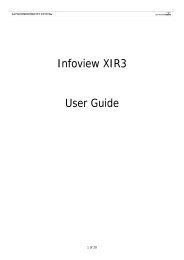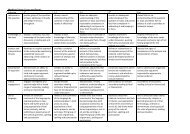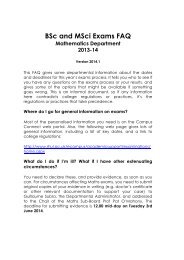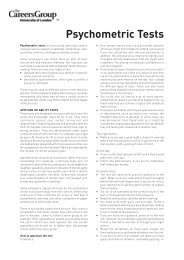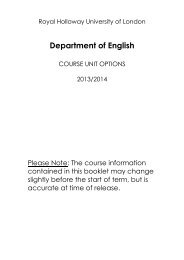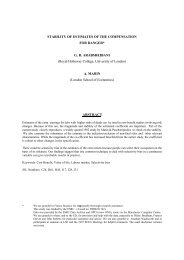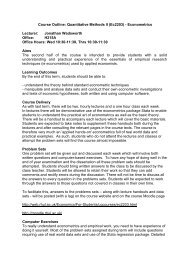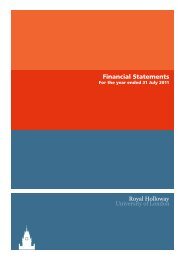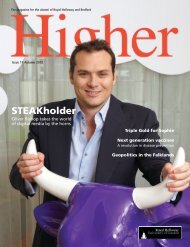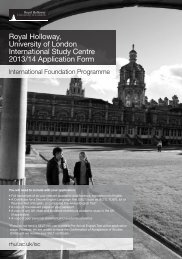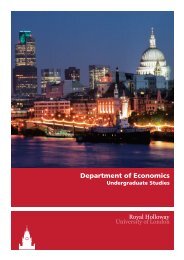MN3225 Course Outline 2012 - Royal Holloway, University of London
MN3225 Course Outline 2012 - Royal Holloway, University of London
MN3225 Course Outline 2012 - Royal Holloway, University of London
You also want an ePaper? Increase the reach of your titles
YUMPU automatically turns print PDFs into web optimized ePapers that Google loves.
<strong>Royal</strong> <strong>Holloway</strong><br />
<strong>University</strong> <strong>of</strong> <strong>London</strong><br />
European Business <strong>MN3225</strong><br />
<strong>Course</strong> <strong>Outline</strong><br />
<strong>Course</strong> Director: Dr Sigrun M. Wagner<br />
Email: Sigrun.M.Wagner@rhul.ac.uk<br />
Twitter: http://twitter.com/smwagner_RHUL<br />
Office Hours (Autumn Term):<br />
Tuesday 14.00-16.00<br />
Thursday 10.30-12.30<br />
(Office hours for the Spring Term will be announced on MOODLE in January)<br />
Office: Room 021, Moore Annexe
European Business, <strong>MN3225</strong> <strong>Course</strong> <strong>Outline</strong><br />
A. <strong>Course</strong> Summary<br />
B. Aims<br />
C. Learning Outcomes<br />
D. Required <strong>Course</strong> Textbook<br />
E. Teaching and Learning Methods<br />
F. <strong>Course</strong> Content - Overview <strong>of</strong> Lecture and Workshop Topics<br />
G. Assessment<br />
H. Using MOODLE<br />
I. Further Guidance<br />
J. Reading List<br />
A. <strong>Course</strong> Summary<br />
This course examines European business within the European Union (EU)<br />
and in the greater global context. Attention is paid to key institutions, policies<br />
and processes involved in the widening and deepening <strong>of</strong> the union and the<br />
implications <strong>of</strong> such for European businesses and for consumers. We will also<br />
examine the political and economic ties between the EU and the United<br />
States, and between the EU and Russia; this includes some coverage <strong>of</strong> key<br />
trade disputes. Lobbying will also be covered. Journal articles and case<br />
studies will be used to raise and explore key issues. A range <strong>of</strong> other<br />
techniques will serve to stimulate in-class discussions about the European<br />
business environment.<br />
B. Aims<br />
To develop a critical, theoretical and practical understanding <strong>of</strong><br />
European business within the European Union and the greater global<br />
context<br />
To develop an appreciation for the importance <strong>of</strong> using case studies<br />
about different EU member countries, institutions, businesses or<br />
issues, to understand key features <strong>of</strong> the European business<br />
environment and how it impacts on business behaviour<br />
To carry out independent research on the European Union and<br />
European businesses in this context and, in so doing, develop and<br />
utilize a range <strong>of</strong> conceptual, technical and personal skills<br />
C. Learning Outcomes<br />
On successful completion <strong>of</strong> this course, students should be able to:<br />
Understand how different institutions, policies and processes have<br />
shaped the European Union (EU) and the European business<br />
environment<br />
Analyze the interaction between policy frameworks and business<br />
behaviour<br />
Think systematically and critically about the integration process<br />
2
Appreciate and understand the challenges facing European<br />
competitiveness<br />
Analyze the national, regional and global influences on European<br />
business<br />
Understand and examine the complex relationships between the EU<br />
and major trading partners (United States), and between the EU and<br />
emerging markets<br />
Think laterally and critically about European business – skills needed to<br />
be a successful European/international manager<br />
Undertake independent research on a key aspect <strong>of</strong> European<br />
business<br />
D. Recommended <strong>Course</strong> Textbook<br />
Johnson, D. & Turner, C. 2006. European business (2 nd ed.). <strong>London</strong>:<br />
Routledge.<br />
Please note: Students will also be requested to read certain book chapters<br />
and journal articles, which will be available in the university library. This<br />
reading is essential and will add a layer <strong>of</strong> depth to the wider coverage<br />
provided in the core text.<br />
E. Teaching and Learning Methods<br />
This course is taught by means <strong>of</strong> weekly lectures and workshops. Ten onehour<br />
lectures (Wednesdays from 10:00-11:00, location WIN0-02/03) will be<br />
supplemented by eight one-hour workshops which will take place on<br />
Wednesday afternoons unless otherwise specified. You must register for a<br />
session and attend your own session. Both lectures and workshops will be led<br />
by Dr. Sigrun M. Wagner (Sigrun.M.Wagner@rhul.ac.uk). Workshops will<br />
generally focus on case studies, papers and group discussions. Students<br />
must come to the workshops PREPARED unless otherwise indicated. That is,<br />
students should read the assigned cases or papers, prepare notes on such,<br />
and attempt to answer given questions. Students that have not prepared may<br />
be asked to leave the workshop. Students will be required to engage in a<br />
number <strong>of</strong> activities during workshops, which will assist them in understanding<br />
key concepts/issues covered on the course in preparation for coursework and<br />
the exam.<br />
F. <strong>Course</strong> Content - Overview <strong>of</strong> Lecture and Workshop Topics<br />
Please read all <strong>of</strong> the case studies in the assigned chapters. Additional<br />
readings for lectures and workshops may be suggested. Students are<br />
encouraged to read beyond that which is required in preparation for<br />
coursework and the exam.<br />
3
Week<br />
Starting<br />
Lecture Topic and Date Required Reading Workshop Topic and<br />
Required Reading (subject<br />
1 Sept 26 Introduction to European<br />
Business<br />
Sept 28<br />
2 Oct 3 European Economic<br />
Integration – Evolution<br />
and Key Institutions<br />
Oct 5<br />
3 Oct 10 The Enlargement <strong>of</strong> the<br />
European Union: The<br />
Eastern Enlargement<br />
Oct 12<br />
4 Oct 17 The Enlargement <strong>of</strong> the<br />
European Union:<br />
Candidate Countries<br />
(Turkey)<br />
Oct 19<br />
5 Oct 24 Economic and Monetary<br />
Union (EMU)<br />
Oct 26<br />
6 Oct 31 The European Consumer<br />
and Consumer<br />
Ch. 2 – McCormick, 2008,<br />
The Idea <strong>of</strong> Europe;<br />
Ch. 3 – Johnson and Turner,<br />
2006, European Business in<br />
a Global Context<br />
Ch. 2 – Johnson and Turner,<br />
2006, The Integration<br />
Imperative;<br />
Ch. 3 – McCormick, 2008,<br />
The Evolution <strong>of</strong> the EU; Ch.<br />
4 – Watts, 2008, The<br />
Movement to Integration: a<br />
Theoretical Perspective<br />
Ch. 16 – Johnson and<br />
Turner, 2006, Central and<br />
Eastern Europe;<br />
Ch. 14 – Watts, 2008,<br />
Member States<br />
The required reading will<br />
focus on the McLaren, Üçer<br />
and Ülgen articles.<br />
Ch. 8 – Johnson and Turner,<br />
2006, Economic and<br />
Monetary Union (as with all<br />
chapters in the core text,<br />
please read the Case 8.1 –<br />
„opting out <strong>of</strong> the EMU‟);<br />
Ch. 15 – Dinan, 2005,<br />
Economic & Monetary Union<br />
Ch. 15 - Johnson and<br />
Turner, 2006, Europe and<br />
to change)<br />
No Workshop.<br />
Read the following paper<br />
BEFORE the workshop:<br />
Smoke in your eyes: the<br />
trouble over tobacco control<br />
in the European Union, Duina<br />
and Kurzer, 2004, Journal <strong>of</strong><br />
European Public Policy, Vol.<br />
11, Issue 1, pp. 57–77.<br />
(Available electronically)<br />
No Workshop.<br />
Read the following materials<br />
BEFORE the workshop:<br />
Turkey‟s Eventual<br />
Membership <strong>of</strong> the EU:<br />
Turkish Elite Perspectives on<br />
the Issue, McLaren, 2000,<br />
Journal <strong>of</strong> Common Market<br />
Studies, March, Vol. 38,<br />
Issue 1, pp. 117–29.<br />
Turkey‟s Accession to the<br />
European Union, Üçer, 2006,<br />
Futures, 38, pp. 197-211.<br />
(Available electronically)<br />
Turkish Business and EU<br />
Accession, Ülgen – to be<br />
handed out in the preceding<br />
LECTURE.<br />
To be announced (TBA).<br />
Read the following cases<br />
BEFORE the workshop and<br />
4
Protection<br />
Nov 2<br />
7 Nov 7 Relations between the<br />
European Union and the<br />
United States<br />
Nov 9<br />
8 Nov 14 Relations between the<br />
European Union and<br />
Russia<br />
Nov 16<br />
9 Nov 21 European Competition<br />
Policy and Lobbying<br />
Nov 23<br />
10 Nov 28 European Business<br />
Leadership in a Global<br />
Marketplace<br />
Nov 30<br />
11 2 nd<br />
Term<br />
Revision (Date to be<br />
announced)<br />
the Consumer<br />
Ch. 17 - Johnson and<br />
Turner, 2006, European<br />
Business in a Global<br />
Context;<br />
Ch.18 – Dinan, 2005, U.S. –<br />
EU Relations<br />
Ch. 18 – Johnson and<br />
Turner, 2006, Europe and<br />
Emerging Economies<br />
Ch. 5 – Johnson and Turner,<br />
2006, European Competition<br />
Policy<br />
Kets de Vries, M. and<br />
Korotov, K. 2005. The future<br />
<strong>of</strong> an illusion: In search <strong>of</strong><br />
the new European business<br />
leader. Organizational<br />
Dynamics, 34(3): 218–230.<br />
(Available electronically)<br />
No Workshop<br />
answer questions:<br />
Case 15.1, The BSE Crisis,<br />
Johnson and Turner 2006,<br />
pp. 347-349.<br />
Case 15.2, Airline<br />
Compensation, Johnson and<br />
Turner 2006, p. 353.<br />
Read the following case<br />
study BEFORE the<br />
workshop:<br />
Banana Wars: Challenges to<br />
the European Union‟s<br />
Banana Regime – to be<br />
handed out in the preceding<br />
LECTURE.<br />
Read the following article<br />
BEFORE the workshop:<br />
Keynote Article: Russia and<br />
the EU: Strategic Partners or<br />
Strategic Rivals? Light, 2008,<br />
Journal <strong>of</strong> Common Market<br />
Studies, Volume 46, Annual<br />
Review, pp. 7–27.<br />
(Available electronically)<br />
Russia-EU: The Partnership<br />
that Went Astray, Europe-<br />
Asia Studies, Vol. 60, No. 6,<br />
pp. 1107-119.<br />
(Available electronically)<br />
Read the following case<br />
BEFORE the workshop:<br />
Intel Corporation: European<br />
Union Antitrust Case – to be<br />
handed out in the preceding<br />
LECTURE.<br />
We will also have an inworkshop<br />
(FINAL) activity!!<br />
No preparation is necessary.<br />
5
G. Assessment<br />
Assessment will be divided into two parts:<br />
1. 30% <strong>Course</strong>work Essay – 2500 word essay (+/- 10%).<br />
The essay is due by no later than 12:00 on Tuesday, November 29th,<br />
2011. You must submit two copies <strong>of</strong> the essay (one hard copy and<br />
one electronic copy to Turnitin). We strongly urge you to keep a copy <strong>of</strong><br />
the essay for yourself. Please consult your School <strong>of</strong> Management<br />
Undergraduate Student Handbook, for the full regulations on the<br />
submission <strong>of</strong> coursework and the penalties for late submission <strong>of</strong><br />
work. (Students will not receive their results for the essay until after the<br />
Christmas break).<br />
2. 70% Written Examination (Summer Term – Term 3)<br />
<strong>Course</strong>work Essay – Answer ONE <strong>of</strong> the following questions:<br />
1. How can British companies benefit from operating within the European<br />
Union? Are there any disadvantages?<br />
2. What effect does the “Euro zone crisis” have on the European<br />
integration project? Discuss.<br />
3. How does lobbying in the European Union create benefits for European<br />
industries and businesses? Is it a legitimate practice?<br />
4. Discuss the difficulties facing the Eastern European member states‟<br />
accession to the EU in 2004 and 2007. Has accession been in the best<br />
interests <strong>of</strong> EU citizens and businesses?<br />
Essay Checklist: 1, 2, 3 and 4! (READ THIS PLEASE!!!)<br />
i) Structure – Begin your essay with a thesis statement – one or two<br />
sentences that condense the argument or analysis to follow. (e.g.<br />
Lobbying created benefits for businesses for X reasons, specifically<br />
… Or e.g. In retrospect, it was not in the best interest for Eastern<br />
European member states to join the EU because …). The thesis<br />
statement is then followed by an introduction, which outlines both<br />
the essay‟s structure and the main points for discussion. The body<br />
<strong>of</strong> the essay is where arguments should be developed, and proved<br />
or disproved according to the evidence. Be sure the discussion here<br />
is relevant to the topic at hand. Finally, summarize key points made<br />
throughout the essay and highlight any conclusions to be drawn.<br />
ii) Argument and Content – The argument refers to the „point <strong>of</strong> view‟<br />
to be discussed. It should be captured by the thesis statement. The<br />
argument or point <strong>of</strong> view should be clearly developed throughout<br />
the essay, and supported by the evidence and analyses.<br />
6
iii) Supportive Evidence – You must use evidence – relevant and<br />
reliable information, figures and/or examples (e.g. pertaining to<br />
countries, industries or businesses) – to support your argument and<br />
the claims made.<br />
iv) Referencing – Use the appropriate reading materials - articles<br />
(academic and non-academic articles), books, reports etc. – to back<br />
up your argument(s). Regardless <strong>of</strong> whether or not a work is quoted<br />
from directly or indirectly, all work cited in the BODY <strong>of</strong> the<br />
submitted piece <strong>of</strong> work must have the author‟s name and date<br />
published in parentheses following the citation (e.g. Jones and<br />
Smith, 2005; or Johnson, 2010). If the work is quoted from directly,<br />
page numbers must also be included. Work cited must be listed at<br />
the end <strong>of</strong> the essay in a section titled „References‟. Please use the<br />
Harvard Style <strong>of</strong> referencing here. References must be listed in<br />
alphabetical order, and written up consistently and accurately. Also,<br />
the essay must be an original piece <strong>of</strong> work and students should not<br />
be working together. Plagiarising the work <strong>of</strong> others, or work<br />
produced by the individual student for another project, will result in<br />
a mark <strong>of</strong> ZERO.<br />
v) Style and Presentation – Essays should be double-spaced. Be sure<br />
the essay is well structured and contains accurate spelling and<br />
grammar. Sections <strong>of</strong> the essay should be highlighted with the<br />
appropriate headings. Headings should describe the issue(s) to be<br />
discussed. Also, please note that signposting is very important. In<br />
essays this is where you signal to the reader, at the beginning <strong>of</strong><br />
each section, the direction you will take (the structure you will adopt<br />
– e.g. this section discusses three key reasons why lobbying is<br />
beneficial for European business, including …).<br />
Please note: If you would like to discuss the outline <strong>of</strong> your essay with the<br />
lecturer, then please do during <strong>of</strong>fice hours. You have up until November 22 nd<br />
to do so, at the latest. No exceptions.<br />
Assessment Criteria for essays:<br />
In addition to the essay checklist i, ii, iii, iv and v, please consult the School <strong>of</strong><br />
Management Undergraduate Student Handbook, for the criteria according to<br />
which your essay will be assessed. They include: intellectual qualities<br />
expressed, structure and organisation, level <strong>of</strong> reading, quality <strong>of</strong> referencing,<br />
and writing style.<br />
Exam<br />
You will be examined on topics discussed in the lectures and workshops.<br />
Active reading by students on these topics is recommended. See reading list.<br />
Other reading materials may also be suggested. Students should also stay on<br />
top <strong>of</strong> current affairs.<br />
7
H. Using MOODLE<br />
Lecture slides will be posted on MOODLE the day before the lecture. Please<br />
note that while the slides are meant to be clear and helpful, there is much<br />
more to the lectures than the slides and they should not be seen as a<br />
substitute for such.<br />
I. Further Guidance<br />
Lectures and workshops begin no later than 5 minutes past the hour. Do not<br />
be late as it is very disruptive. Mobile phones should not be used during<br />
sessions.<br />
J. Reading List<br />
Core text:<br />
Johnson, D. & Turner, C. 2006. European business (2 nd ed.). <strong>London</strong>:<br />
Routledge.<br />
Recommended readings will be selected from these books on the European<br />
Union:<br />
Dinan, D. 2005. Ever closer union: an introduction to European integration (3 rd<br />
ed.). Boulder, Colorado: Lynne Rienner.<br />
McCormick, J. 2008. Understanding the European Union: A concise<br />
introduction (4 th ed.). New York: Palgrave Macmillan.<br />
Watts, D. 2008. The European Union. Edinburgh: Edinburgh <strong>University</strong> Press.<br />
Please note: Several copies <strong>of</strong> these books are available in the university<br />
library.<br />
Examples <strong>of</strong> other useful readings across topics discussed on the course:<br />
Arikan, H. 2006. Turkey and the EU: An awkward candidate for EU<br />
membership? (2 nd ed.). Aldershot: Ashgate.<br />
Blair, A. 2010. The European Union since 1945. New York: Pearson.<br />
Bourdieu, P. 2005. The social structures <strong>of</strong> the economy. Cambridge: Polity.<br />
Chang, M. 2009. Monetary integration in the European Union. Hampshire:<br />
Palgrave Macmillan.<br />
Chesnais, F., Ietto-Gilles, G. & Simonetti, R. 2000. European integration and<br />
global corporate strategies. <strong>London</strong>: Routledge.<br />
8
Debeljak, A. 2004. The hidden handshake: National identity and Europe in the<br />
post-Communist world. Lanham, MD: Rowman & Littlefield.<br />
Dent, C. 1997. The European economy: The global context. <strong>London</strong>:<br />
Routledge.<br />
Dinan, D. 2006. Origins and evolution <strong>of</strong> the European Union. Oxford: Oxford<br />
<strong>University</strong> Press.<br />
Greenwood, J. 2007. Interest representation in the European Union.<br />
Basingstoke: Palgrave MacMillan.<br />
Grosse, R. (ed.) 2005. International Business and Government Relations in<br />
the 21 St Century. Cambridge: Cambridge <strong>University</strong> Press.<br />
Hague, R. & Harrop, M. 2007. Comparative government and politics: An<br />
introduction (7 th ed.). Hampshire: Palgrave.<br />
Hardacre, A. 2011. How the EU Institutions Work and... How to work with the<br />
EU Institutions. John Harper Publishing.<br />
Harris, N. 1999. European business (2 nd ed.). <strong>London</strong>: Macmillan Business.<br />
Harris, P. & McDonald, F. (Eds.) (2004). European Business & Marketing.<br />
<strong>London</strong>: Sage.<br />
Herslund, M. & Samson, R. (Eds.) 2005. (Unity in Diversity) Europe and the<br />
European Union: Enlargement and constitutional treaty. Copenhagen:<br />
Copenhagen Business School Press.<br />
Hickson, D. & Pugh, D. 1995. Management worldwide: The impact <strong>of</strong> societal<br />
culture on organizations around the globe. <strong>London</strong>: Penguin Books.<br />
Hill, C. 2011. International business: Competing in the global marketplace (8 th<br />
ed.). <strong>London</strong>: McGraw-Hill.<br />
Hine, D. & Kassim, H. 1998. Beyond the market: The EU and National social<br />
policy. <strong>London</strong>: Routledge.<br />
Hodges, C. 2005. European regulation <strong>of</strong> consumer product safety. Oxford:<br />
Oxford <strong>University</strong> Press.<br />
Johnson, D. & Robinson, P. 2004. Perspectives on EU-Russian Relations.<br />
<strong>London</strong>: Routledge.<br />
Lane, J. (Ed.) 2002. European Union-U.S. Trade Conflicts and Economic<br />
Relationship. New York: Novinka Books.<br />
Lawrence, P. 1998. Issues in European business. Basingstoke: Macmillan<br />
Business.<br />
9
Macmaoláin, C. 2007. EU food law: Protecting consumers and health in a<br />
common market. Oxford: Hart Publishing.<br />
Michalski, A. 2006. The enlarging European Union. In J. Richardson (Ed.),<br />
European Union: Power and Policy-making (3 rd ed.): 271-293. <strong>London</strong>:<br />
Routledge.<br />
Moran, R. T. & Riesenberger, J. R. 1994. The global challenge: Building the<br />
new worldwide enterprise. <strong>London</strong>: McGraw-Hill.<br />
O‟Brennan, J. 2006. The eastern enlargement <strong>of</strong> the European Union. New<br />
York: Routledge.<br />
Owen, G. 1999. From empire to Europe. <strong>London</strong>: Harper Collins.<br />
Paliwoda, S. & Marinova, S. 2007. The marketing challenges within the<br />
enlarged single European Market. European Journal <strong>of</strong> Marketing, 41(3/4):<br />
233-244.<br />
Pridham, G. 2005. Designing democracy: EU enlargement and regime<br />
change in post-Communist Europe. New York: Palgrave Macmillan.<br />
Richardson, J.J. & Coen, D. 2009. Lobbying the European Union: institutions,<br />
actors, and issues. Oxford: Oxford <strong>University</strong> Press.<br />
Rollo, J. 2002. In or out: The choice for Britain. Journal <strong>of</strong> Public Policy, 22(2):<br />
217-238.<br />
Schimmelpfennig, F. & Rittberger, B. 2006. Theories <strong>of</strong> European integration:<br />
Assumptions and hypotheses. In J. Richardson (Ed.), European Union: Power<br />
and policy-making (3rd ed.): 73-95. <strong>London</strong>: Routledge.<br />
Slater, J., Strange, R.& Wang, L. 1998. Trade and investment in China: The<br />
European Experience. <strong>London</strong>: Routledge.<br />
Smith, M. 2001. The European Union‟s commercial policy: Between<br />
coherence and fragmentation. Journal <strong>of</strong> Public Policy, 8(5): 787-802.<br />
Stiglitz, J. 2002. Globalization and its discontents. <strong>London</strong>: Penguin Books.<br />
Tsoukalis, L. 2000. European political economy. Oxford: Oxford <strong>University</strong><br />
Press.<br />
Wallace, H., Pollack, M. A., Wallace, W. 2010. Policy-making in the European<br />
Union (6 th ed.). Oxford: Oxford <strong>University</strong> Press. (older editions available)<br />
10
Academic journals that are particularly relevant to this course include:<br />
Europe-Asia Studies<br />
European Management Journal<br />
Journal <strong>of</strong> Common Market Studies<br />
Journal <strong>of</strong> European Public Policy<br />
Regional Studies<br />
Please note that we have access to all <strong>of</strong> these journals.<br />
Other journals, which may be useful to this course:<br />
Business and Society<br />
European Journal <strong>of</strong> Marketing<br />
International Affairs<br />
International Business Review<br />
Journal <strong>of</strong> Economic Perspectives<br />
Journal <strong>of</strong> Management Studies<br />
Journal <strong>of</strong> Public Affairs<br />
Journal <strong>of</strong> Public Policy<br />
Journal <strong>of</strong> World Business<br />
Policy Studies Journal<br />
Useful non-academic articles can be found in the following publications:<br />
European Business Forum<br />
Financial Times, Economist, The Week<br />
Useful online sources:<br />
http://europa.eu<br />
http://eubusiness.com<br />
http://www.bbc.co.uk<br />
http://euobserver.com/<br />
http://www.euractiv.com/en<br />
http://studentthinktank.eu/<br />
Twitter (treat with care!):<br />
http://europatweets.eu/<br />
@TheEconomist<br />
@eu_eeas<br />
@EINEUNews<br />
@EuropeanAgenda<br />
@SocialEurope<br />
@council<strong>of</strong>europe<br />
@Berlaymont<br />
@EU_Commission<br />
@European_Union<br />
@EuropeanVoiceEV<br />
@ePolitix<br />
@euissuetracker<br />
@foreign<strong>of</strong>fice<br />
@BBCRadio4<br />
@EUtube<br />
@FinancialTimes<br />
@ftbrusselsblog<br />
@smwagner_RHUL ( #<strong>MN3225</strong>)<br />
11



